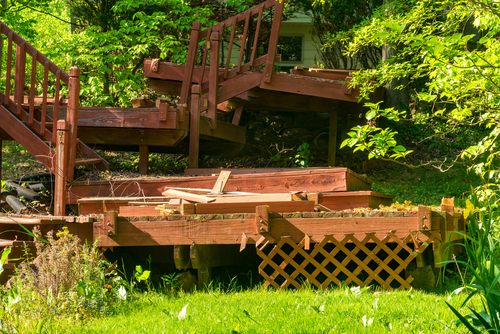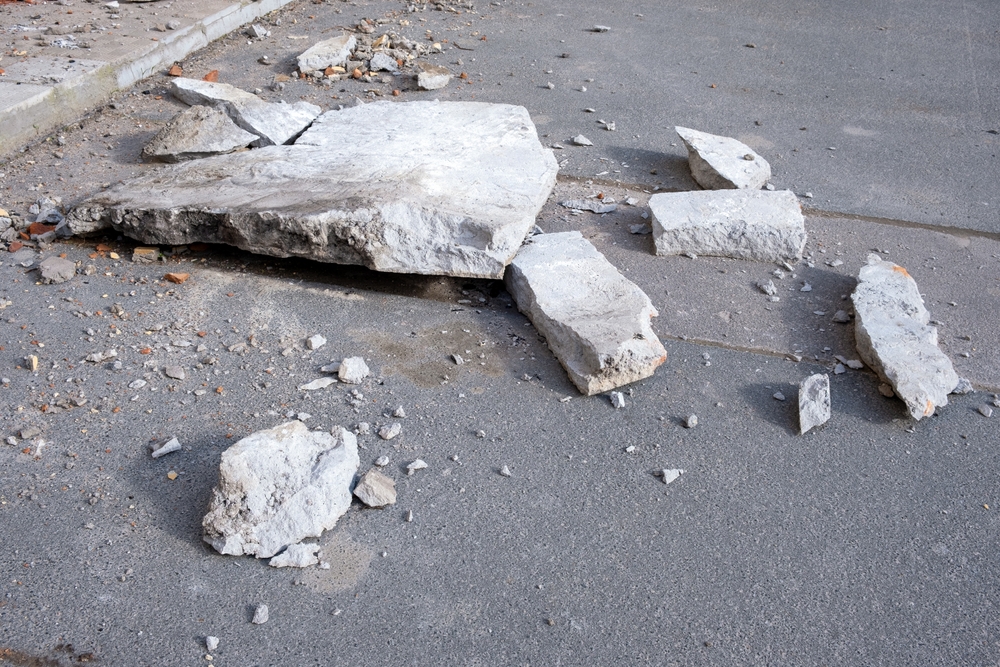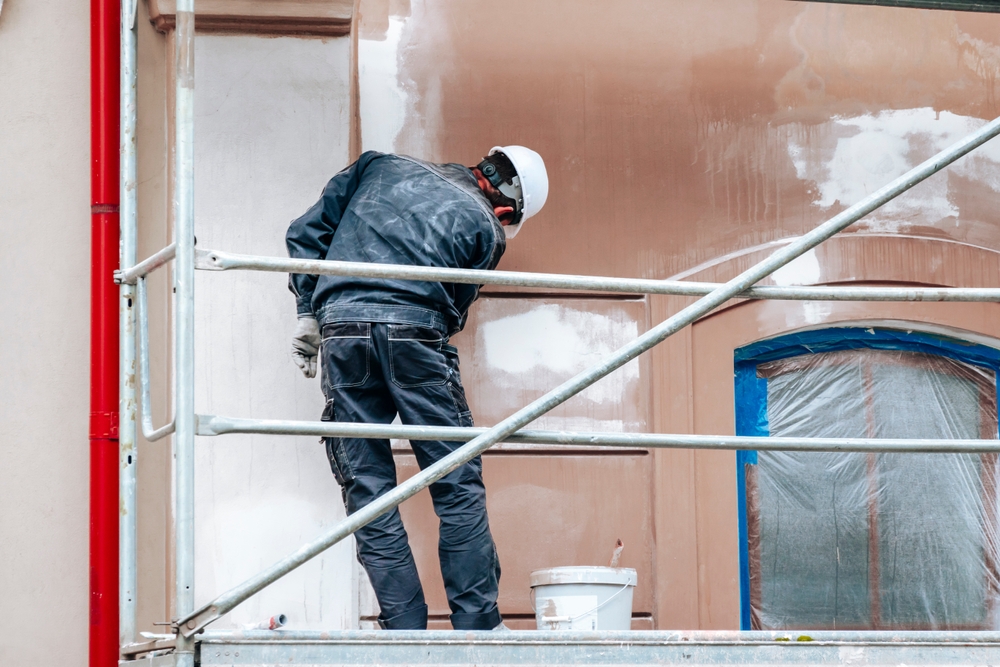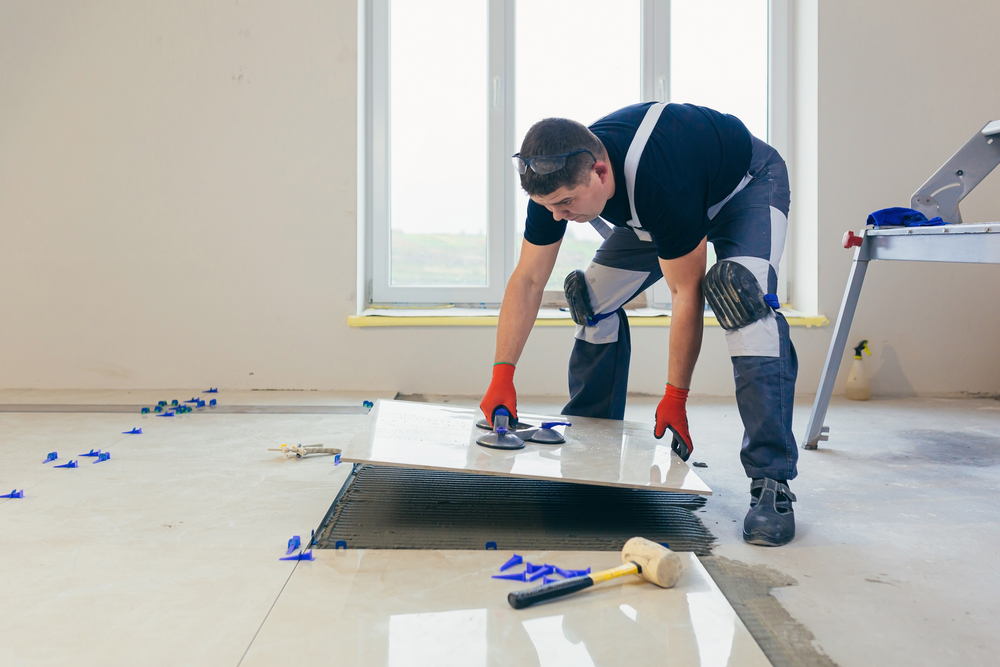May 17, 2024 - Benjamin Ehinger
Deck Demolition for Different Types of Decks: A Comprehensive Guide
CALL NOW 844-762-8449
Demolishing a deck is an important step in the process of backyard renovation or preparing for a new deck installation. Whether you’re dealing with a worn-out wood platform or a dilapidated composite deck, understanding the proper techniques and safety measures is crucial. As you embark on this project, knowing how to dismantle the structure efficiently and safely can save you time and headaches. It’s essential to consider the use of a roll-off dumpster rental to manage the debris, ensuring a clean and organized workspace throughout the demolition process.
As you plan for the demolition of your deck, attention to detail and adherence to safety protocols cannot be overstressed. From assessing the condition of the deck to choosing the right tools for the job, every step must be meticulously planned. Protective gear such as gloves, safety glasses, and hard hats are indispensable to prevent injuries. Moreover, understanding the local regulations and whether you need a demolition permit are part of thorough preparation, ensuring your project complies with all municipal guidelines.
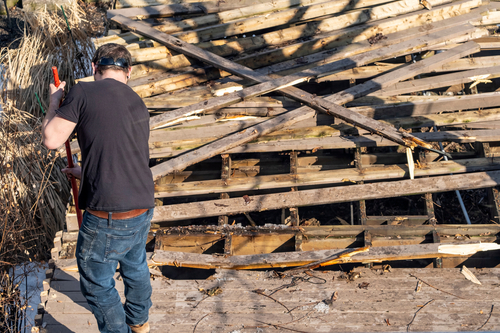 Before you start the demolition of your deck, understand that the process requires caution and proper use of tools to ensure safety and efficiency. It’s vital to wear personal protective equipment and to be familiar with the handling of powerful demolition tools.
Before you start the demolition of your deck, understand that the process requires caution and proper use of tools to ensure safety and efficiency. It’s vital to wear personal protective equipment and to be familiar with the handling of powerful demolition tools.
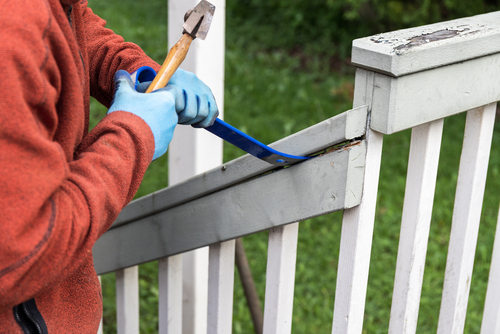 For an efficient deck demolition, knowing the best strategies in both professional and DIY contexts is crucial. The following tips streamline the process, saving time and preventing unnecessary labor.
For an efficient deck demolition, knowing the best strategies in both professional and DIY contexts is crucial. The following tips streamline the process, saving time and preventing unnecessary labor.
Key Takeaways
- Proper planning and use of safety gear are imperative for effective deck demolition.
- Roll-off dumpster rentals facilitate orderly debris management and disposal.
- Compliance with local regulations and permits is crucial during demolition.
Evaluating Deck Demolition Needs
Before you begin the demolition process, it’s crucial to evaluate your deck’s condition and materials. These insights will inform your demolition strategy and help you maximize the potential for salvaging materials.Determining Deck Age and Materials
Age: Understanding the age of your deck is fundamental in predicting the extent of deterioration you may encounter. For a composite deck, which typically lasts between 25 to 30 years, the breakdown of materials may not be as advanced as with a wooden deck. If your deck has surpassed its expected lifespan, you should prepare for more comprehensive demolition needs. Deck Material: Ascertain whether your deck is made from wood, composite, or a different type of material. Wooden decks often age differently compared to composite decks, which are designed for longevity but may have unique challenges, such as the recycling of materials.Assessing Salvageable Materials
Salvageable Material: Examine the deck for any materials that can be reused or repurposed. Components such as railings, balusters, and even intact boards can often be salvaged. The feasibility of salvaging materials will largely depend on the condition of the deck and the type of materials used. For instance, solid wood components might find a second life in a different project, while certain composite materials can be more difficult to repurpose due to their construction. Condition Assessment: Take a close look for signs of wear, rot, or structural damage. This will not only ensure a safe demolition process but also help you determine what parts of the deck are salvageable. Keep in mind that even aged materials can be suitable for other uses, provided they are still in good condition.Safety Precautions and Planning
Before you begin deck demolition, it’s crucial to prioritize your safety and ensure all necessary documentation is in order. Thorough planning minimizes risks and streamlines the demolition process.Understanding Safety Protocols
Your personal safety is paramount during deck demolition. Equip yourself with safety gear including gloves, goggles, and a hard hat to protect against potential safety hazards. It’s not just about having the gear; you must know how to use it. Familiarize yourself with proper handling of tools and machinery, and stay vigilant to avoid accidents. Use the following safety equipment checklist:- Gloves: Protect hands from splinters and nails
- Goggles: Shield eyes from debris
- Hard hat: Prevent head injuries
- Ear protection: Guard against long-term hearing damage due to noise
- Dust mask or respirator: Filter out harmful particles when sawing or sanding
Securing the Right Permits
Before any demolition work starts, you’re responsible for securing the proper permits. Permitting requirements can vary widely by location, so check your local building codes to determine what’s needed. Failure to obtain the right licenses can lead to fines or forced work stoppages. Remember, this step in planning is about complying with regulations to avoid legal issues and ensuring the work is done legally and safely.The Deck Demolition Process
 Before you start the demolition of your deck, understand that the process requires caution and proper use of tools to ensure safety and efficiency. It’s vital to wear personal protective equipment and to be familiar with the handling of powerful demolition tools.
Before you start the demolition of your deck, understand that the process requires caution and proper use of tools to ensure safety and efficiency. It’s vital to wear personal protective equipment and to be familiar with the handling of powerful demolition tools.
Deck Dismantling Steps
- Assess the Deck: Inspect your deck for signs of rot or damage. This will give you an idea of how much effort the project will require and which sections to tackle first.
- Begin with the Deck Boards: Start at one end of your deck and pry off the deck boards using a pry bar, exposing the joists underneath. Proceed with caution to avoid damaging underlying structures if you plan to reuse or donate materials.
- Move to the Railings and Stairs: After the deck boards, focus on removing any handrails or stair materials, working your way from the top down.
- Dismantle the Frame: Once the surface is clear, you can begin to dismantle the frame of the deck. Remove any joists and support beams by detaching them from their connecting points.
- Remove the Posts: Deck post removal is often the most challenging step. Cut the posts at ground level or just below the deck frame using a reciprocating saw or a circular saw, and then lift them out.
Tools and Equipment Required
- Power Tools: A reciprocating saw and a circular saw are essential for cutting through large timbers and deck posts. Ensure you have multiple heavy-duty blades suited for wood and nails.
- Hand Tools: You will need a pry bar, a hammer, and possibly a nail puller for extracting nails and screws.
- Safety Gear: Always wear safety glasses, gloves, and sturdy boots during demolition to protect against flying debris and accidents.
Handling Deck Debris and Disposal
When you demolish a deck, managing the remaining debris is crucial to ensure a clean and safe environment. It involves understanding the costs associated with debris removal and how to properly dispose or recycle materials.Disposing of Construction Debris
After the demolition of your deck, your first task is to deal with the pile of debris. Renting a dumpster is a common solution, with costs generally between $200 and $800 depending on the size you need. Your local waste management services might allow curbside disposal for small amounts, but larger projects will require a construction dumpster rental.- DIY Method: You might consider hauling the debris yourself, which involves renting a trash trailer or utility trailer. Remember to check the fees for dumping at a local landfill or transfer station.
- Professional Service: Hiring a company to handle your debris removal not only ensures proper disposal but can also be safer for you. These services typically charge by volume, so you’ll pay based on how much space your deck debris occupies in their truck.
Options for Recycling and Waste Management
Recycling the materials from your demolished deck is environmentally responsible and can sometimes be cost-effective. Many materials like untreated wood, metal, and certain plastics can be recycled.- Wood: Untreated lumber can often be turned into mulch or used for other building projects.
- Metals: Components such as nails, screws, and brackets are commonly recycled at scrap metal facilities.
- Plastics/Composite: These might be recyclable depending on your local recycling guidelines. Always check before disposal.
Deck Demolition Efficiency Tips
 For an efficient deck demolition, knowing the best strategies in both professional and DIY contexts is crucial. The following tips streamline the process, saving time and preventing unnecessary labor.
For an efficient deck demolition, knowing the best strategies in both professional and DIY contexts is crucial. The following tips streamline the process, saving time and preventing unnecessary labor.
Professional Techniques for Efficient Removal
When hiring a contractor, seek out those with a proven track record of efficiency. Professionals often use power tools and heavy equipment to expedite the demolition process. Specialized gear, such as saws and pry bars, can dismantle decks rapidly and thoroughly. If you’re considering professional help for your deck removal, investigate companies that have efficient methods to save on both time and cost. Remember, the right contractor will have a clear plan of action and all necessary permits in place before starting the job.Optimizing DIY Deck Removal Practices
DIY deck removal can be a rewarding but challenging project—you need to adopt a strategic approach for maximum efficiency. Here are some steps to ensure your DIY efforts are streamlined:- Preparation:
- Ensure you have all necessary tools before starting.
- Rent a dumpster for debris disposal.
- Safety:
- Wear protective gear: goggles, gloves, and sturdy boots.
- Disconnect any utilities attached to the deck.
- Demolition:
- Start from the top down—remove railings and stairs before deck boards.
- Cut large sections into smaller pieces for easy handling and disposal.
- Cleanup:
- Use a magnet to collect stray nails or screws.
- Sort materials for recycling if possible.
Professional Deck Demolition Services
When considering deck demolition, it’s critical to recognize the value of engaging professional services. Professionals bring expertise and efficiency to the project, ensuring it is done safely and in compliance with local regulations.Benefits of Hiring a Professional
- Expertise: Professional contractors have the necessary skills and experience to demolish decks safely and efficiently. They are adept at handling various materials, from wooden structures to composite decking.
- Equipment: Pros possess the specialized tools required for dismantling a deck effectively, minimizing potential damage to your property.
- Insurance: Reliable deck demolition contractors are insured, protecting you from liability in the event of accidental property damage or worker injury.
- Permit Assistance: They can assist in obtaining the necessary demolition permits, ensuring legal compliance and avoiding potential fines.
How to Choose the Right Contractor
- Get Multiple Quotes: Approach several contractors to receive detailed estimates, allowing for comparison of costs and services offered.
- Verify Credentials: Ensure the contractor is licensed and insured. Confirm their credentials to safeguard your interests during the demolition process.
- Look for Red Flags: Be wary of contractors who request full payment upfront or those who do not provide a formal contract. These can be red flags indicating unreliable service providers.
- Read Reviews: Check online reviews and testimonials to gauge previous clients’ satisfaction and to identify any recurring issues with the contractor’s work.
Beyond Deck Demolition: Next Steps
When your old deck is removed, you have a blank canvas in your backyard. It’s the perfect opportunity to consider the landscape and envision what structures or enhancements could redefine your outdoor living space.Preparing for Landscaping or New Structures
After deck demolition, the exposed ground needs attention before you can transition to landscaping projects or install new structures. If you’re planning on a green, lush lawn, you’ll need to enrich the soil with compost and select the right type of grass for your climate. For those aiming to add structures such as a shed or pergolas, ensure proper leveling of land to prevent future issues with your new additions.Enhancing Your Outdoor Living Space
The removal of a deck opens up possibilities to reimagine your outdoor living space. Whether you’re looking to install a new, modern deck or perhaps consider a stone patio for durability, start by measuring the available space. For a more relaxed atmosphere, integrating a pool can offer a refreshing escape during hot summers. Your options are broad: think fire pits, outdoor kitchens, or even an open-air lounge area. Select features that complement each other and cater to your lifestyle.Frequently Asked Questions
When contemplating deck demolition, you likely have questions regarding the process, costs, regulations, and impact on your property. Look no further for clear, trustworthy answers to common inquiries on deck demolition.What are the necessary steps for DIY deck demolition?
For a DIY deck demolition, you should first check with local authorities about necessary permits. Then, systematically dismantle your deck, starting with the railings and working your way down to the framework, using appropriate tools for disassembly and safety.How is deck demolition and removal typically priced?
Pricing for deck demolition and removal is commonly based on square footage. Professional services may charge between $5 and $15 per square foot, affected by factors like deck size, construction materials, and accessibility.Which dumpster rental size is best for my deck demolition project?
Selecting the right dumpster rental size for your project depends on the scale of your deck. A small to medium-sized deck may require a 10-yard dumpster to 20-yard dumpster, while a larger deck may necessitate a 30-yard dumpster or 40-yard dumpster.What are the regulations for deck demolition in coastal areas like Florida?
Deck demolition in coastal areas often involves additional regulations due to environmental concerns. You must be aware of special zoning laws and permits unique to these regions to ensure compliance with state-specific guidelines like those in Florida.Are there companies that offer free deck removal services?
Some companies may offer free deck removal services in exchange for the salvageable lumber. However, this is less common, and you typically need to cover the costs associated with deck demolition and waste disposal.What is the cost difference between professional deck removal and doing it yourself?
Opting for professional deck removal can be more expensive upfront compared to doing it yourself. However, consider the value of time, equipment rental, and waste disposal fees when weighing DIY costs against professional services.Can removing my deck affect my property’s value?
The impact of deck removal on your property’s value varies. If the deck is in poor condition, removal may enhance curb appeal and safety, potentially increasing value. Conversely, eliminating a functional and aesthetically pleasing outdoor space could decrease your home’s market appeal.RECENT BLOGS
Our Reviews
Glenda Lanier Prowell
1721758635
I have ordered an 11 yard dumpster to be delivered to my house.Lonier was extremely helpful and answered all my questions. The rate was very reasonable.
Cedric Smikle
1721660395
Amber was extremely professional and courteous. She answered all of my questions and even some that I didn’t know I needed to ask.
Cait Kaider
1721243051
I highly recommend Waste Removal USA for their responsiveness and how the staff work hard to provide exceptional customer service. They have done well by us and our clients. Thank you!
Easom Family
1721223306
Louiner Pierre-Louis Is awesome! Did a great job. Will definitely be using this same company for all my dumpster needs because of his awesome customer service! Thank you!!!
tabitha Vazquez
1720539988
Wonderful and fast customer service!
LATEST BLOGS

